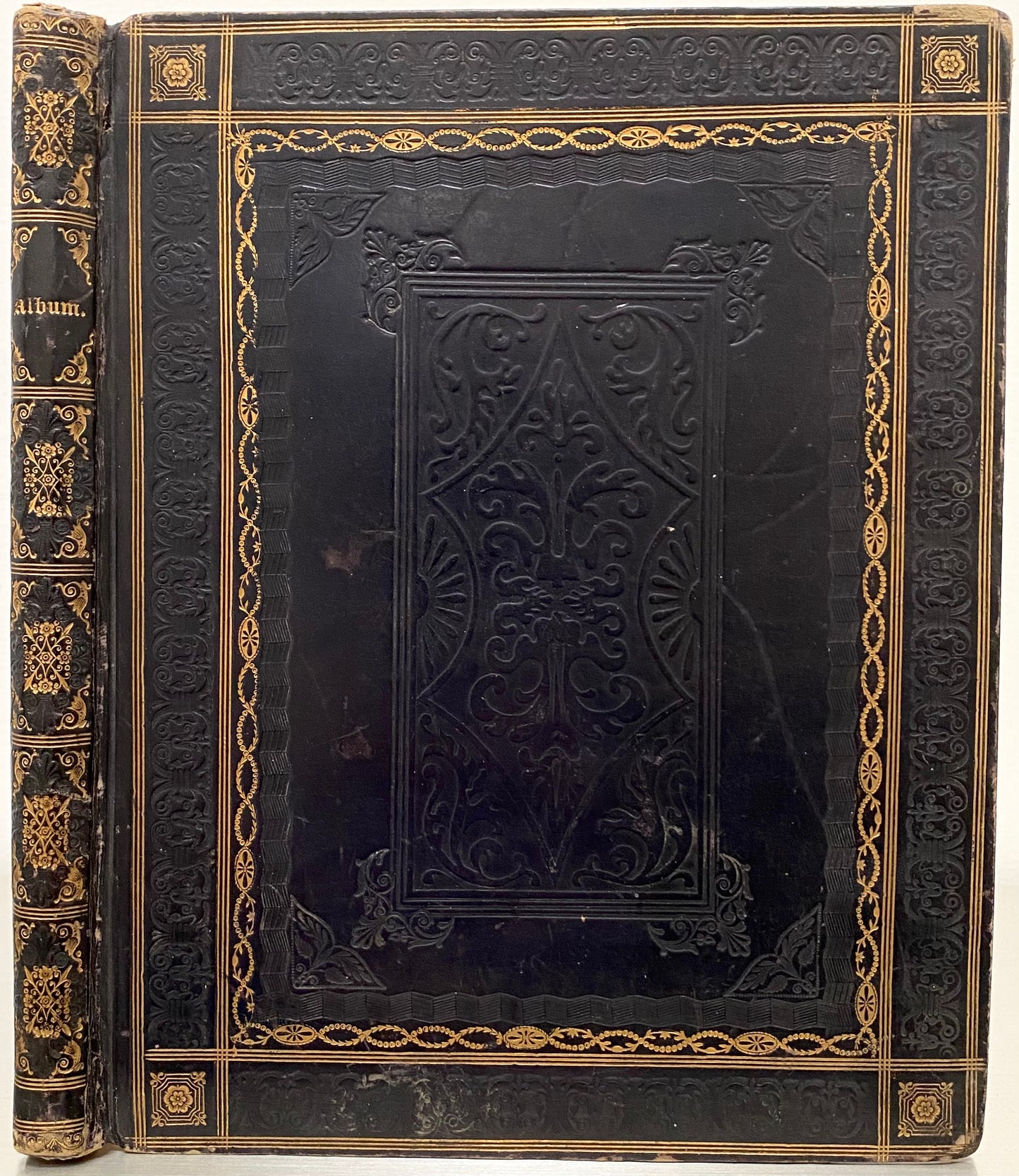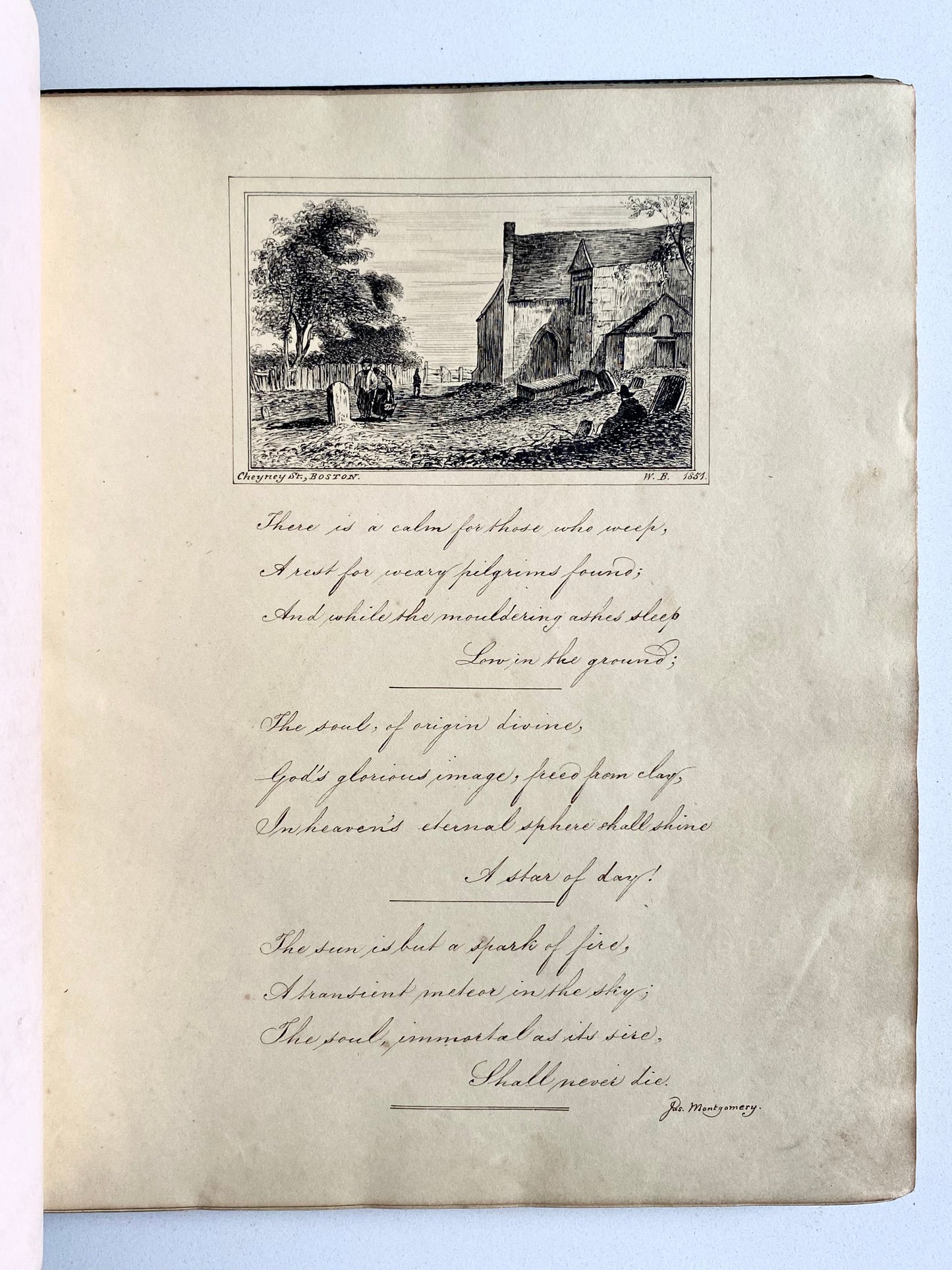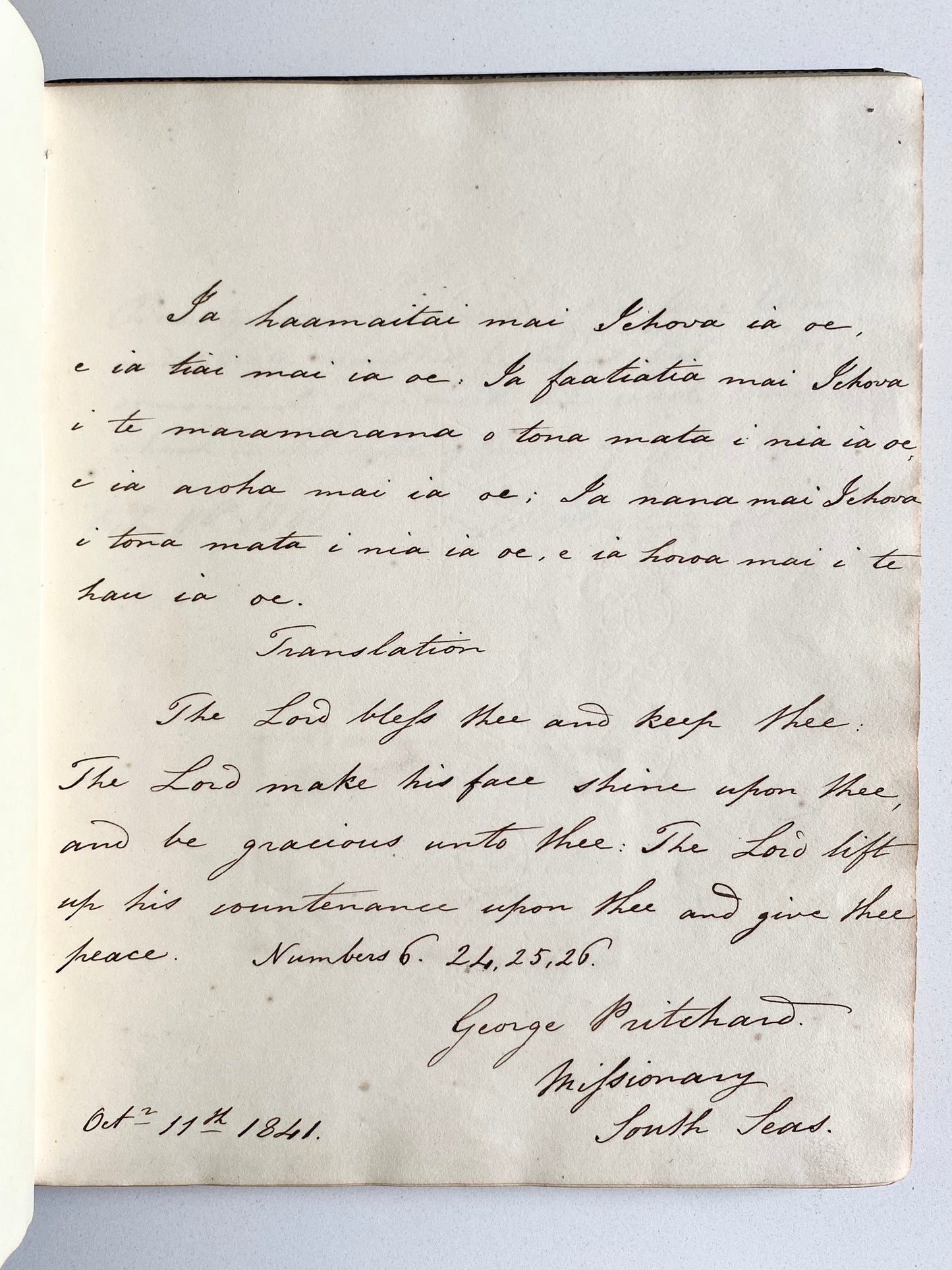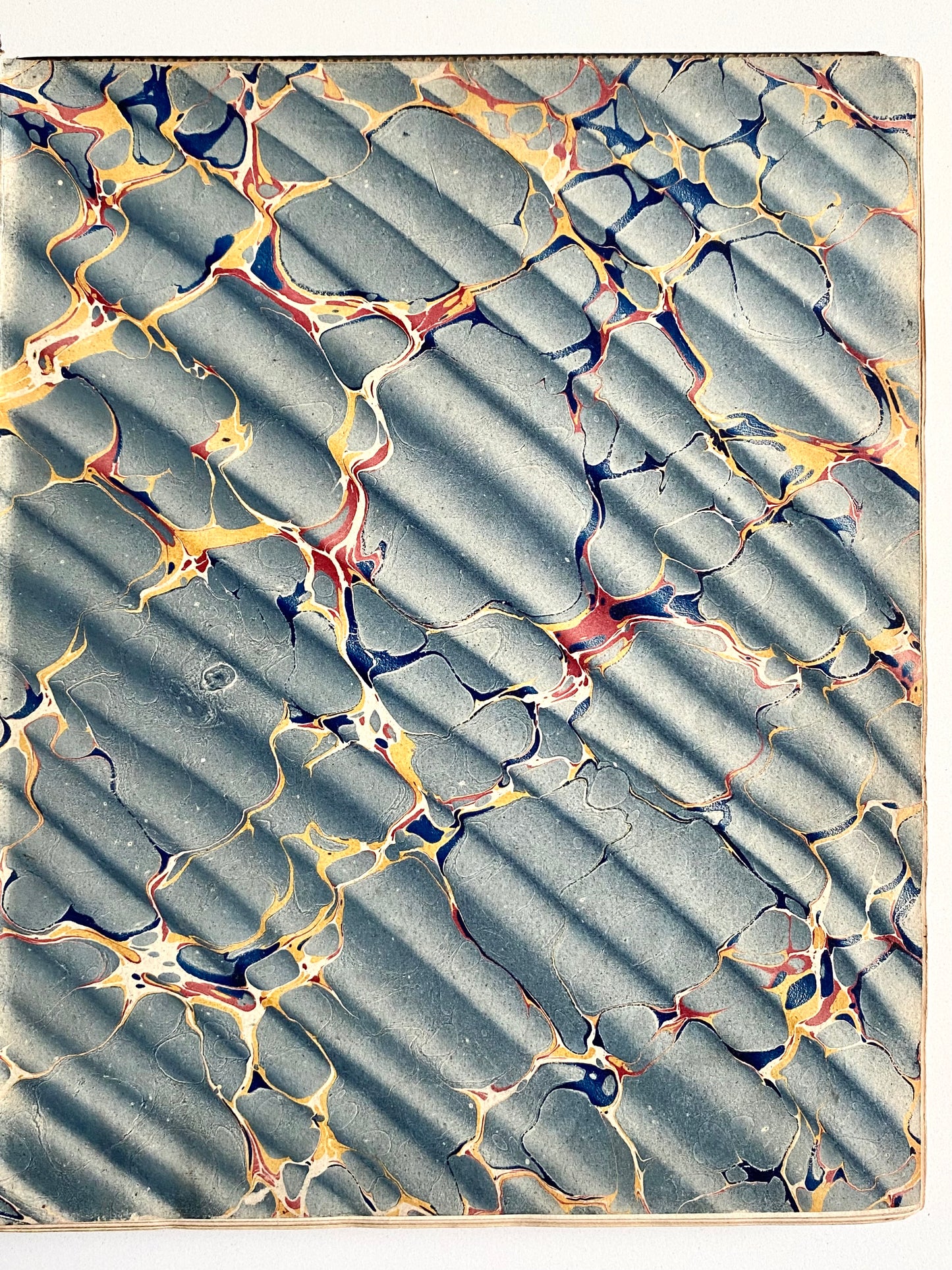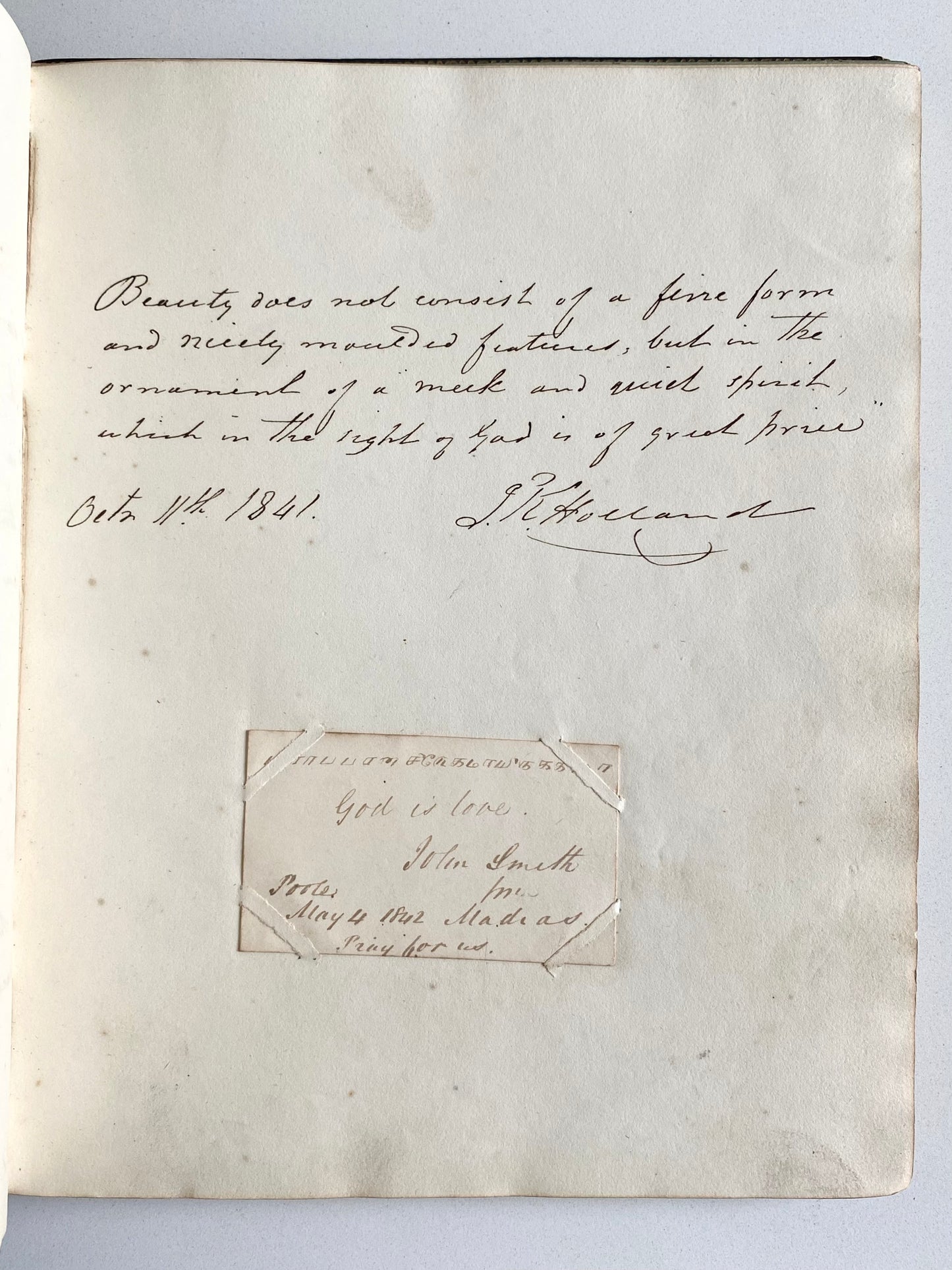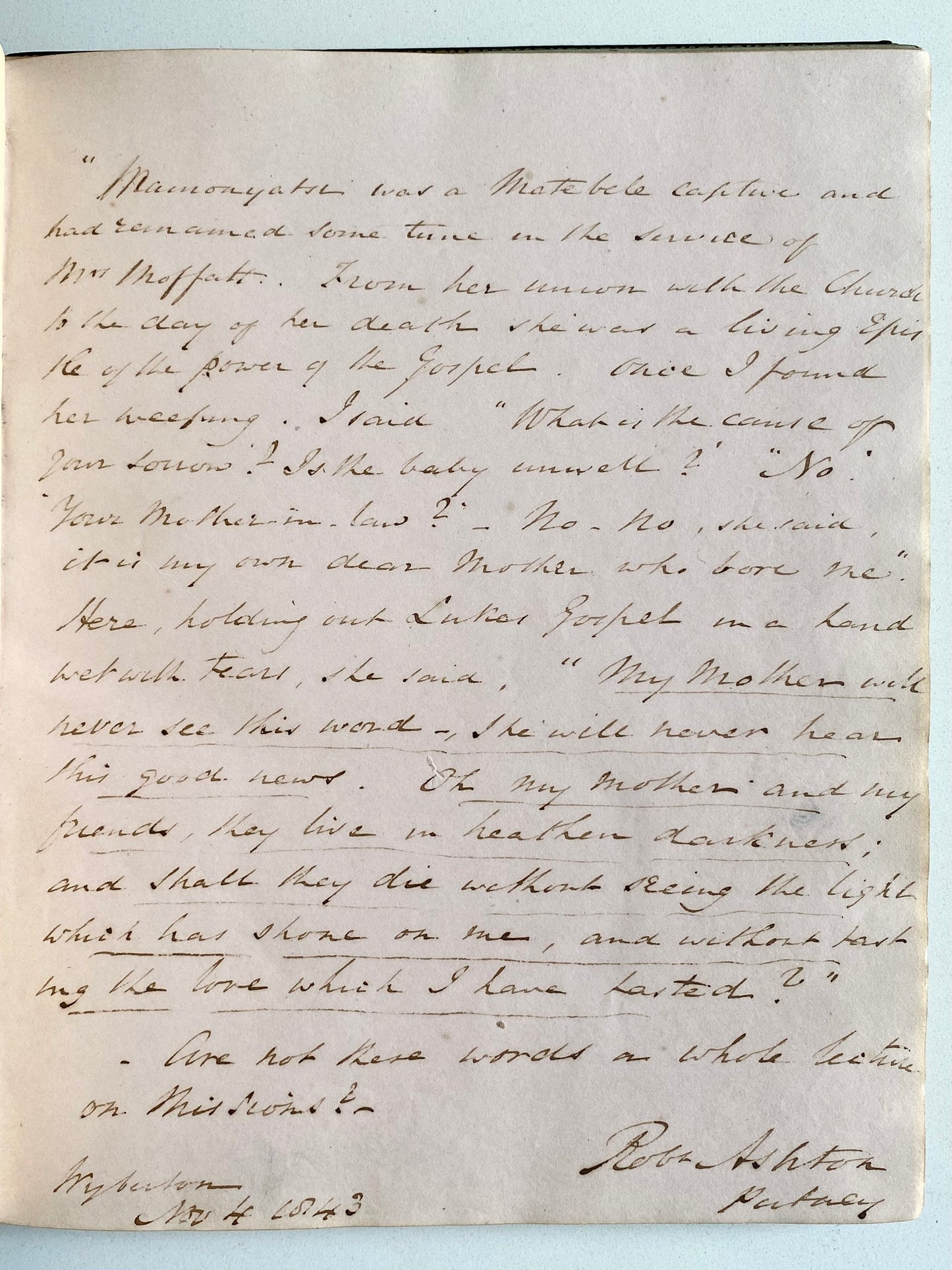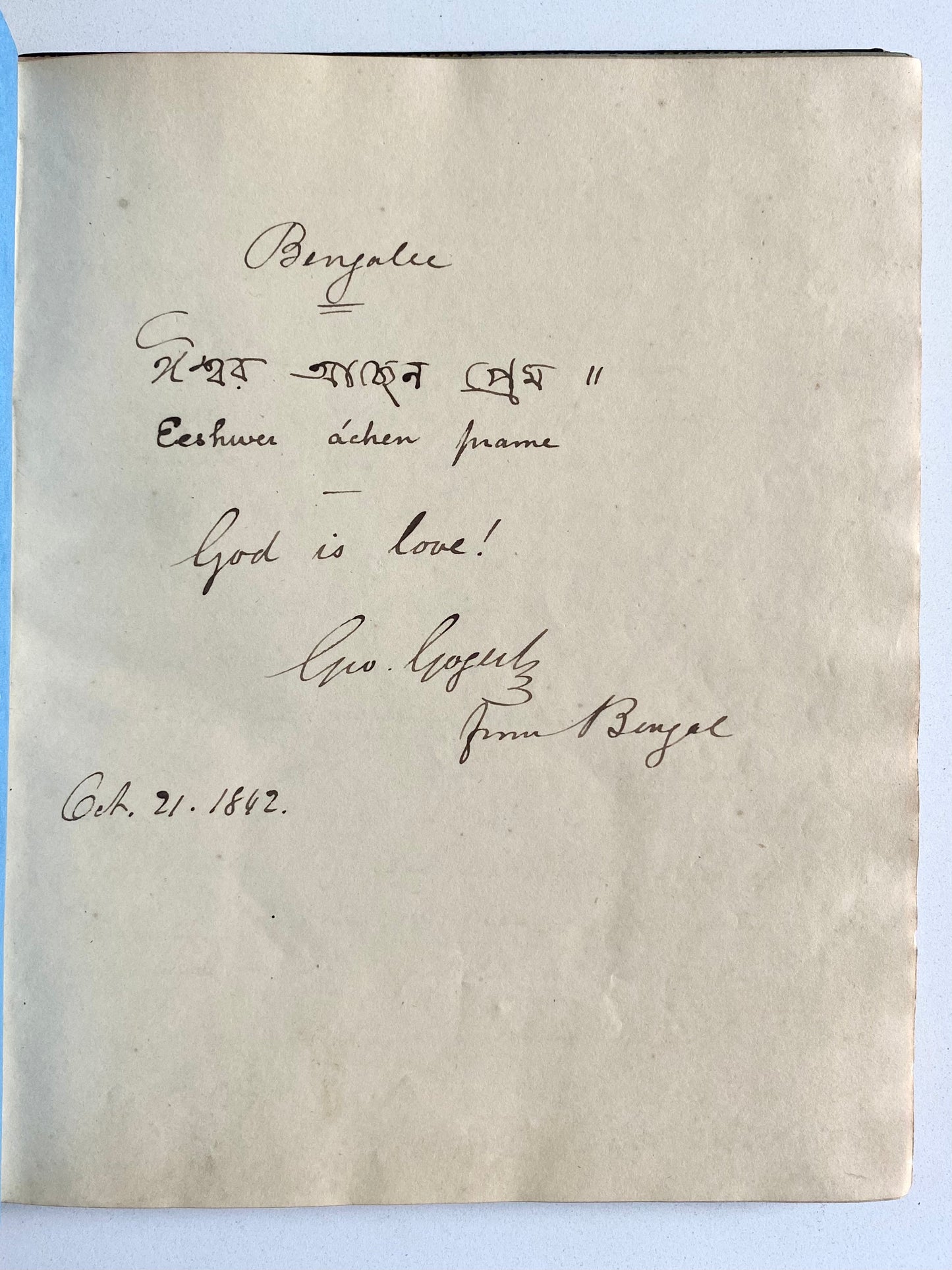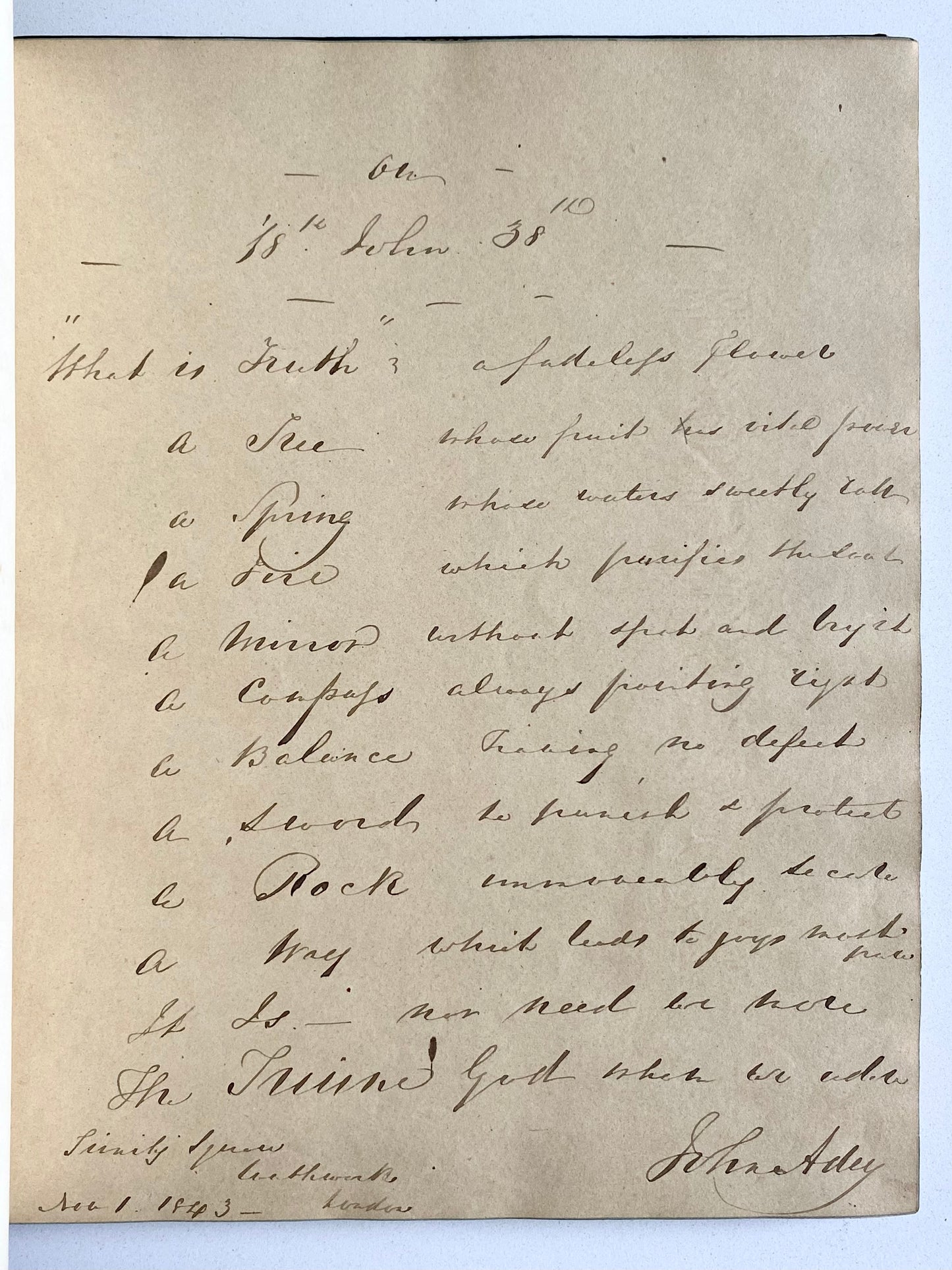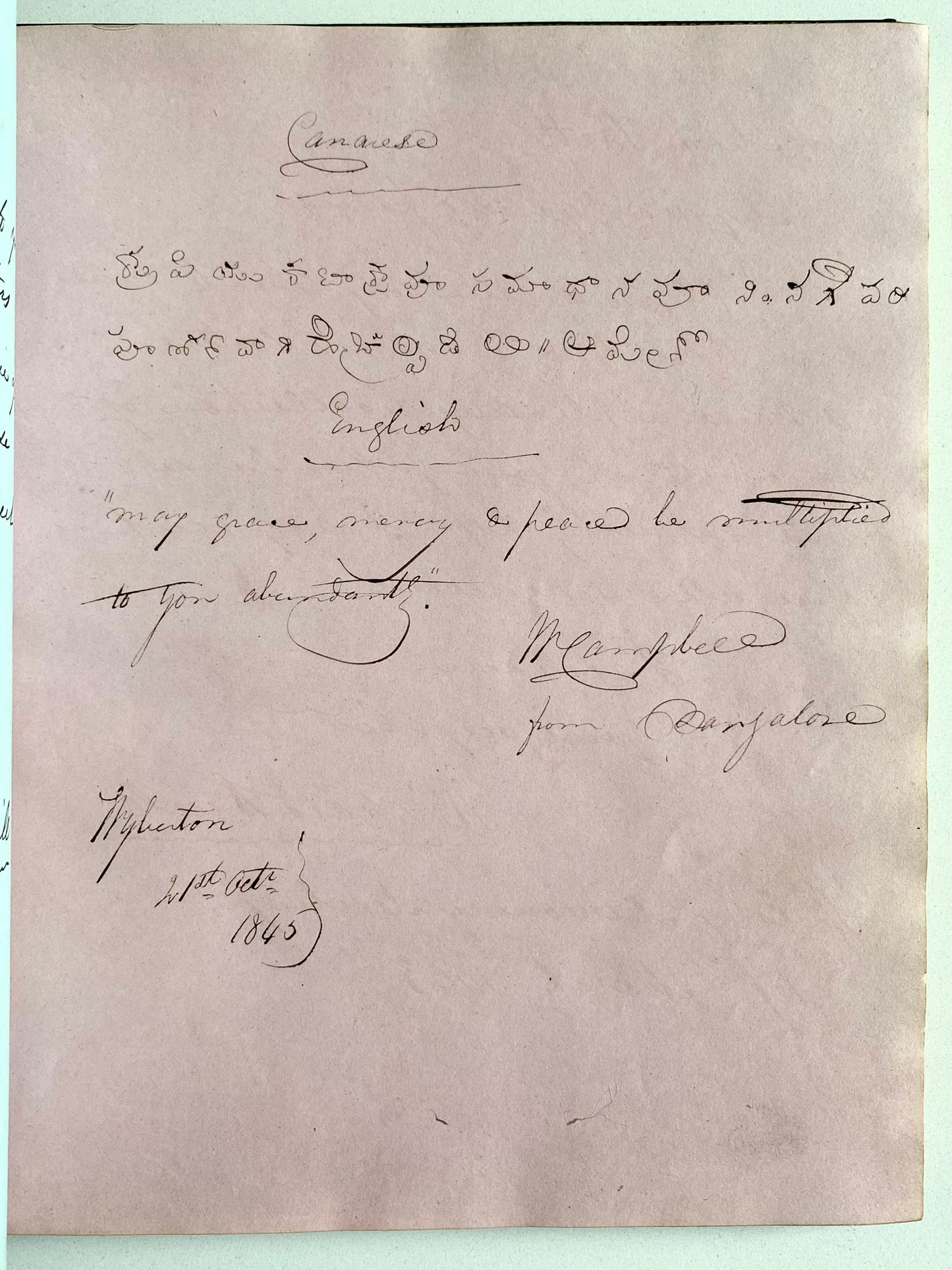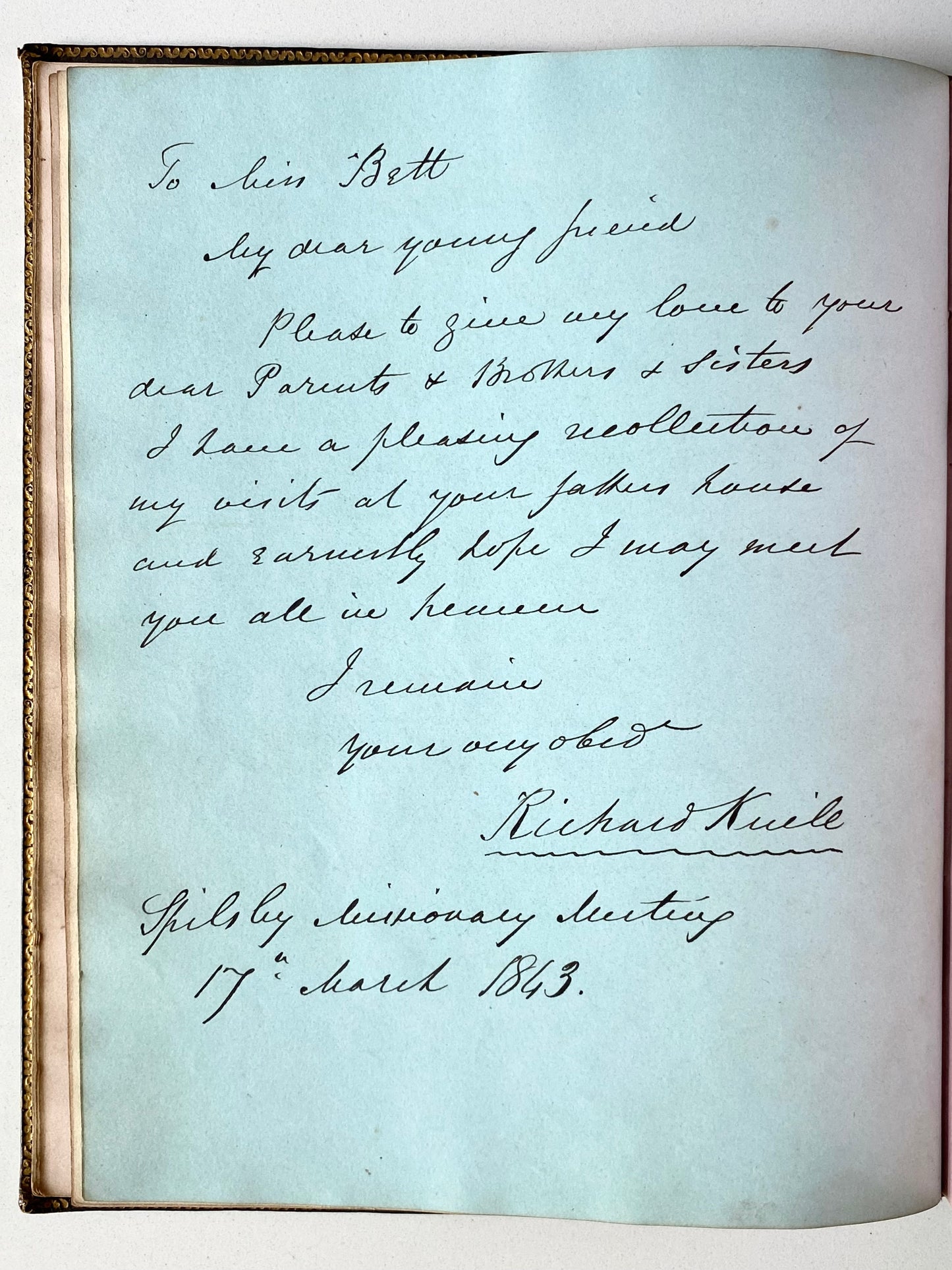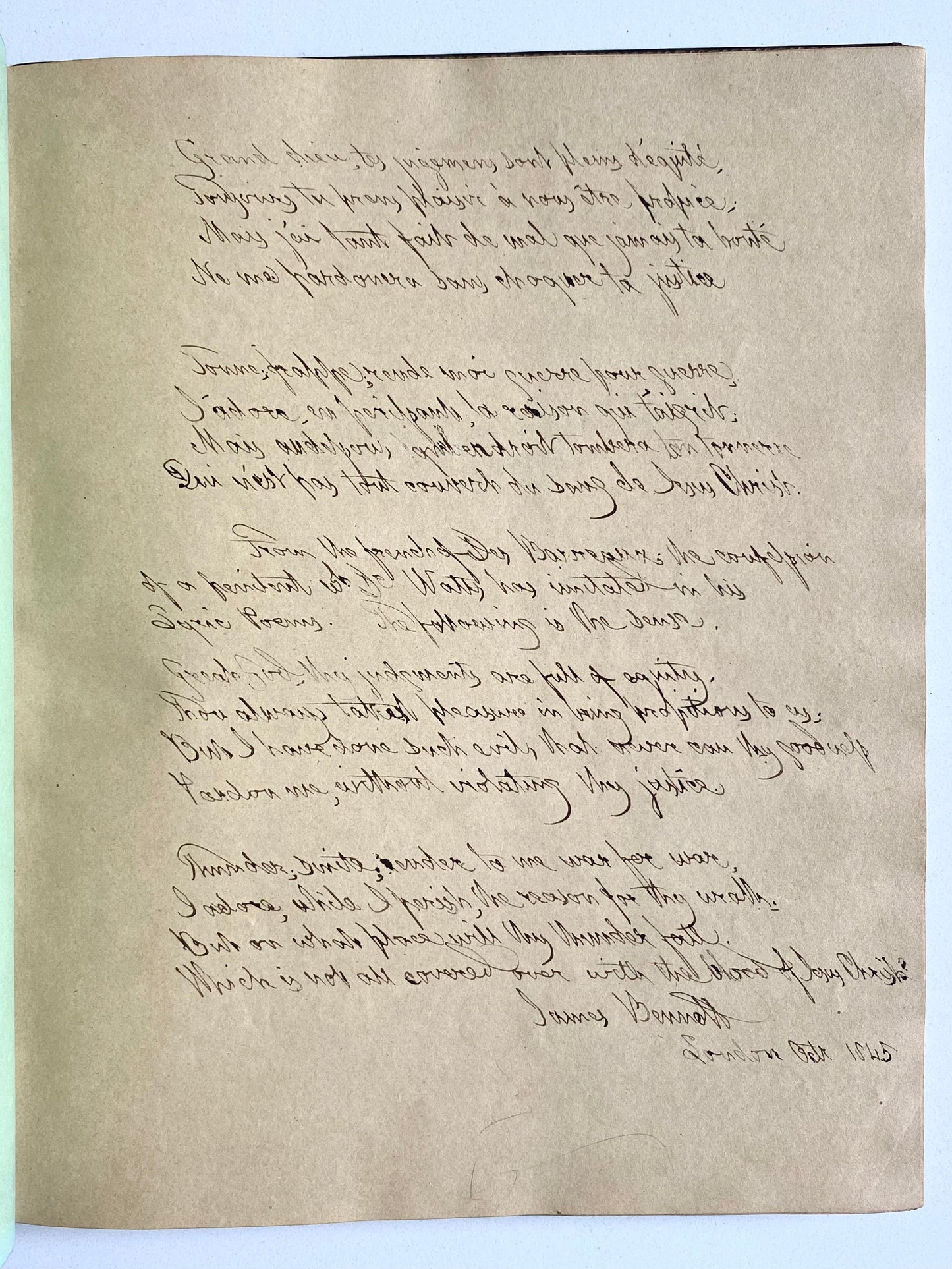Specs Fine Books
1842 MISSIONARY AUTOGRAPH ALBUM. Richard Knill, George Pritchard, Early Indian Missionaries &c.
1842 MISSIONARY AUTOGRAPH ALBUM. Richard Knill, George Pritchard, Early Indian Missionaries &c.
Couldn't load pickup availability
Fantastic Trans-Atlantic autograph album bound by Noble of Boston. A fascinating album of Boston / American Ownership, but clearly assembled in the United Kingdom, including missionary autographs acquired at the Spilsbury Meetings of the London Missionary Society, etc. V
Very attractive, full leather. Some rubbing, a bit cocked. Very sound and clean and attractive.
Extensive contents include:
*Full page inscription of the story of Mamotlobogi, a convert of Robert Moffat’s among the Bechuana, this account apparently unpublished. We trace no examples of it elsewhere. Signed by its author, “Horncastle. August 16th, 1842. John Pain.” Pain was minister at Horncastle and an influential missionary preacher.
*Full page non-authorial copy of “There is a calm for those who weep” by Moravian Hymnist, James Montgomery. At the header is a beautiful drawing labeled, “Cheyney St. Boston. W. B. 1851.”
*Full page inscription of the Aaronic blessing in Tahitian and English by influential South Seas missionary, George Pritchard [1796-1883]. Dated to October 11th, 1841 and signed, “George Pritchard. Missionary. South Seas.”
George Pritchard [1796 – 1883] was an influential early British missionary. Born in Birmingham, Pritchard, studied at the missionary seminary at Gosport before travelling in 1824 to the Society Islands to undertake work for the London Missionary Society. In 1837 he was appointed British consul at Tahiti, advising Queen Pōmare IV. The Islands were annexed by France in spite of his protests, in 1843. He was compelled to leave the islands in 1844 and returned to England. In 1845 he was appointed British consul at Samoa, resigning in 1856 and subsequently living in retirement in England.
In 1844 he published his memoir The Missionary's Reward: Or, the Success of the Gospel in the Pacific, with a second printing in the year of publication.
*5-line inscription from October 11, 1841 by J. K. Holland of the London Missionary Society, “Beauty does not consist of a fine form and nicely moulded features, but in the ornament of a meek and quiet spirit, which in the sight of God is of great price.”
*Clipped and inserted inscription, “God is love [in Tamil]. God is love [English]. Then signed John Smith, Pooles, May 4, 1842, Madras. Pray for Us.
Smith was missionary of the London Missionary Society, and author of The Missionary's Appeal to British Christians, on behalf of Southern India; comprising Topographical Descriptions of The Madras Presidency; notices of the Moral Statistics of its Provinces; Observations on the Character and Condition of its Population; and arguments in favour of Augmented Effort for its Evangelization.
*Full-page inscription, first in Mongolian. Then “Ah, there is the famine to be compared to a famine of the word of God.” By Edward Stallybrass, Missionary from Siberia. Dated to Silsbury, October 27, 1841.
Edward Stallybrass [1794-1884] was a pioneer missionary to the Buryat people of Siberia, translator of the Scriptures in Mongolian, under the auspices of the London Missionary Society.
*Full page inscription in Bengali, [God is Love], then in phonetic Bengali [God is Love], and in English [God is Love]. Signed George Gogerly, from Bengal. October 21, 1842.
Gogerly was a pioneer in India, arriving in 1819. He was a long-time friend of William Carey, whom he visited with shortly before his death, and author of The Pioneers: A Narrative of Facts Connected with Early Christian Missions in Bengal, Chiefly Relating to the Operations of the London Missionary Society.
*Full page inscription by Robert Ashton of Putney on the life of Mamonyatse, a Matebele convert and long-time friend of Mrs. Robert Moffat. Dated November 4, 1843.
*Full page expository inscription of Rev. John Adey from November 1, 1843. Original composition on John 18.38.
*Wonderful full-page inscription by pioneer missionary, Richard Knill [1787-1857]. “To Miss Bett. My dear young friend. Please to give my love to your dear Parents & Brothers & Sisters. I have a pleasing recollection of my visits at your father’s house and earnestly hope I may meet you all in heaven. I remain, your *** obedient, Richard Knill. Spilsbury Missionary Meeting. 17th March 1843.”
Richard Knill was one of the most influential missionaries of the early 19th century.
Initially sent to Madras in 1816 by the London Missionary Society, his health suffered significantly from a bout of cholera. He returned briefly to England to recover and was there convinced of the even more pressing missionary needs of Russia. It would also serve his now fragile health better. He sailed on 18 October 1820 for St. Petersburg. He labored there with great success, and obtained the support of the emperor and the royal family. He also met various members of the Russian nobility including several of the Golitsyn family especially Prince Aleksandr Nicolaevich Golitsyn who served as President of the Russian Bible Society.
A Protestant Bible Society was formed for supplying the Bible in their own tongues to Germans, Finns, Poles, Livonians and other persons not belonging to the Greek church. A school was opened for the children of foreigners, and a mission to the sailors at Kronstadt (the harbour used by the navy about four miles from St. Petersburg) established. He returned to England in August 1833 to obtain funds for erecting a larger church in St. Petersburg. His labors were so successful in creating funds and friends for the London Missionary Society, that he was requested to remain at home, and for eight years he visited almost every place in the United Kingdom, advocating the claims of the foreign missions.
Knill also played a formative role in the life of the young Charles Haddon Spurgeon, encouring the boy to seek salvation and to be a preacher of the gospel. He spent several days with the child Spurgeon at Stambourne Parsonage in 1844, home of Spurgeon's grandfather, praying with him and teaching him. He announced to Charles and his family that the child would one day preach the gospel to great multitudes. Knill was overjoyed to learn of Spurgeon's ministry and wrote to Spurgeon's grandfather in 1855 to express this. Spurgeon later preached for Knill in Chester, shortly before Knill’s death.
*Full page inscription by pioneer missionary to Bangalore, William Campbell of the London Missionary Society. It reads first in Kanarese [or, Kannada], “May grace, mercy, & peace be multiplied to you abundantly.” And then in English, the same. Signed W. Campbell, from Bangalore. Wyberton, 21st October, 1845.
*Full page inscription by Orlando Thomas Dobbin in Cyrillic [School of the Cross; School of Light]. Latin, Schola Crucis, Schola Lucis. And then signed, dated to Horncastle, May 28, 1846. Then Psalm 126.6, “He that goeth forth and weepeth, bearing precious seed, shall doubtless come again with rejoicing, bringing his sheaves with him.”
Dobbin was minister at Arundel, influential advocate for missions, including visits to India under the auspices of the London Missionary Society, Principal of Hully College, and then later minister in Dublin.
His inscription in Cyrillic is somewhat unusual. He seems to have never visited Russia, though he was a formidable linguist, working with many of the original Codices of the New Testament, etc., perhaps he had learned it for that reason.
*An apparently unpublished 5-stanza poem or hymn in the hand of influential Dissenting divine, James Bennett [1774-1862]. In his very distinctive hand, dated to London. October 1845.
Bennett was born in London, 1774, and educated there and at Gosport, where he was prepared for the ministry of the independent church under the Rev. Dr. Bogue. In 1797 he was ordained at Romsey, where he remained till 1813. While there he became an ardent supporter of the London Missionary Society, preaching the annual sermon on its behalf in 1804. He saw the first missionary ship, the Duff, sail from Spithead for foreign lands, and at home he was a co-laborer of Robert and James Haldane in some of their evangelistic tours. He removed in 1813 to Rotherham, where he was both tutor in the college and pastor of the church. In 1828 he was transferred to London, where, first in Silver Street and then in Falcon Square, he exercised his ministry till 1860, when he resigned. He died in London, 4 Dec. 1862, at the age of eighty-eight.
Bennett enjoyed in an unusual degree the esteem and confidence of his friends for the consistency of his character, the loftiness or his aims, the excellence of his judgment, and the laborious diligence which he exhibited as a minister and a supporter of all good public movements. Among the special objects to which he applied himself were the defense of Christianity against the unbelievers of the day, especially against a certain Mr. R. Taylor, a popular lecturer; the promotion of Christian missions, and the advancement of the Congregational Union. As one of the secretaries of the London Missionary Society he came much into contact with its missionaries, both while they were prosecuting their studies and after they engaged in active work. Among those who in their younger days were members of his church was David Livingstone, who spent some time in London after leaving Scotland, chiefly in medical study.
Bennett was a voluminous author. The following are his principal works, including The History of Dissenters, from A.D. 1688 to 1808; Lectures on the History of Christ; Memoirs of the Rev. Dr. Bogue; Lectures on the Preaching of Christ; Congregational Lectures on The Theology of the Early Christian Church; Justification as Revealed in Scripture; Lectures on the Acts of the Apostles; Lectures on Infidelity; etc. etc.
*Full page inscription by Rev. J. P. Hewlett, Minister at Dover, Spilsbury, 1841. He was a prominent supporter of the London Missionary Society, and biographer of the puritan, John Howe, etc.
*Two page poem by Esther Pain of Horncastle, either sister of husband of John Pain of the first page.
*Half page inscription by Rev. Henry Evarard.
*Full-page lengthy poem, A Swarm of Bees in a New Hive signed by William Cutland Fisher of Horncastle
*Wonderful full-page three stanza poem, The Voice of the Mourner arises on high. Signed Thomas Aveling, Kingsland. October 9, 1844. Apparently unpublished.
Thomas Aveling [1815-1884] was a prominent Congregational minister and influential divine. He edited The Jewish Expositor, the publishing arm of the British Society for the Propagation of the Gospel among the Jews, was Chairman of the Congregational Union, etc.
*Poem beginning The raging wind blew – a most terrible blast by Rev. Henry Herbert Hell, Newark, 1846.
*Poem beginning There is in life no blessing like affection, signed Mary Ann Bell of Newark, 1846.
*A superb ink drawing signed G. F. Bayley, Boston. 1848 accompanied by an inscription on the benevolence of God, signed by the same. Seemingly unpublished.
*Three stanza poem, “Hope,” apparently unpublished, signed S. A. Briant [?], London, 1851.
*7 stanza poem The Happiest Time by M.A. Browne, inscribed by Rev. Samuel Barton of Sutterton.
*An unsigned drawing [full-page] of Saint Leodegar’s, Wyberton.
Share
